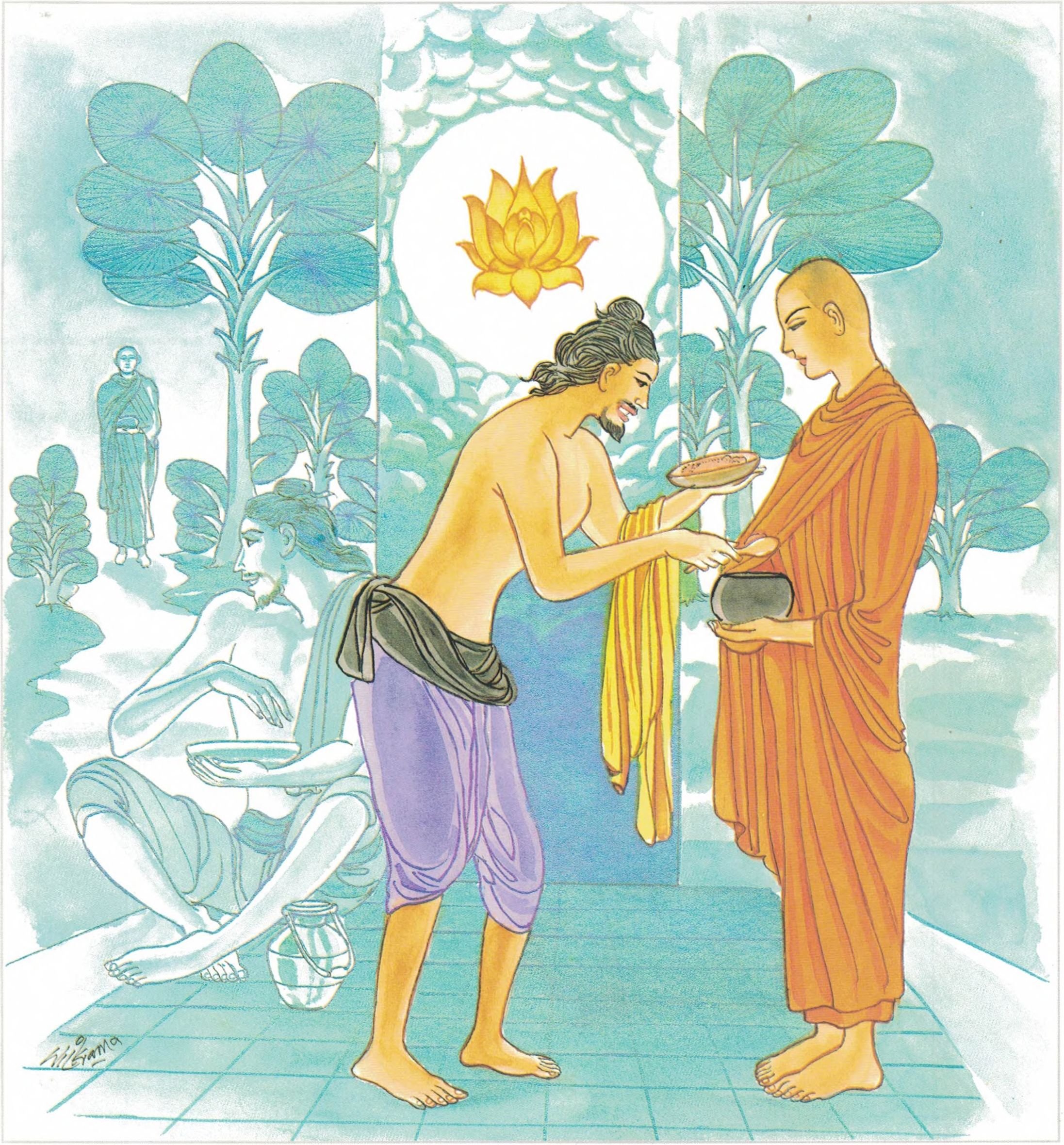Dhammapada (Illustrated)
by Ven. Weagoda Sarada Maha Thero | 1993 | 341,201 words | ISBN-10: 9810049382 | ISBN-13: 9789810049386
This page describes The Story of the Buddha’s Former Deeds which is verse 290 of the English translation of the Dhammapada which forms a part of the Sutta Pitaka of the Buddhist canon of literature. Presenting the fundamental basics of the Buddhist way of life, the Dhammapada is a collection of 423 stanzas. This verse 290 is part of the Pakiṇṇaka Vagga (Miscellaneous) and the moral of the story is “Viewing the possibility of greater happiness, the wise should give up the lesser ones”.
Verse 290 - The Story of the Buddha’s Former Deeds
Pali text, illustration and English translation of Dhammapada verse 290:
mattā sukhapariccāgā passe ce vipulaṃ sukhaṃ |
caje mattāsukhaṃ dhīro sampassaṃ vipulaṃ sukhaṃ || 290 ||
290. If one should see great happiness in giving up small happiness one wise the lesser would renounce the greater full-discerning.
 Viewing the possibility of greater happiness, the wise should give up the lesser ones. |
The Story of the Buddha’s Former Deeds
While residing at the Jetavana Monastery, the Buddha spoke this verse with reference to the power and glory of the Buddha as witnessed by many people on his visit to Vesāli.
Once, a famine broke out in Vesāli. It began with a serious drought. Because of drought, there was almost a total failure of crops and many people died of starvation. This was followed by an epidemic of diseases, and as people could hardly cope with the disposal of the corpses there was a lot of stench in the air. This stench attracted the ogres. The people of Vesāli were facing the dangers of destruction by famine, disease and also by the ogres. In their grief and sorrow they tried to look for a refuge. They thought of going for help from various sources but finally, they decided to invite the Buddha. So a mission headed by Māhāli, the Licchavi prince, and the son of the chief brāhmin were sent to King Bimbisāra to request the Buddha to pay a visit to Vesāli and help them in their distress. The Buddha knew that this visit would be of much benefit to many people, so he consented to go to Vesāli. Accordingly, King Bimbisāra repaired the road between Rājagaha and the bank of the river Gangā. He also made other preparations and set up special resting-places at an interval of every yojana. When everything was ready, the Buddha set out for Vesāli with five hundred monks. King Bimbisāra also accompanied the Buddha. On the fifth day they came to the bank of the river Gangā and King Bimbisāra sent word to the Licchavi princes. On the other side of the river, the Licchavi princes had repaired the road between the river and Vesāli and had set up resting-places as had been done by King Bimbisāra on his side of the river. The Buddha went to Vesāli with the Licchavi princes but King Bimbisāra stayed behind. As soon as the Buddha reached the other bank of the river heavy rain fell in torrents, thus cleansing up Vesāli. The Buddha was put up in the rest-house which was specially prepared for him in the central part of the city. Sakka, king of the devas, came with his followers to pay obeisance to the Buddha, and the ogres fled. That same evening the Buddha delivered the Ratana Sutta and asked the Venerable Ānanda to go around between the threefold walls of the city with the Licchavi princes and recite it. The Venerable Ānanda did as he was told. As the protective verses (parittas) were being recited, many of those who were sick recovered and followed the Venerable Ānanda to the presence of the Buddha. The Buddha delivered the same Sutta and repeated it for seven days. At the end of the seven days, everything was back to normal in Vesāli. The Licchavi princes and the people of Vesāli were very much relieved and were overjoyed. They were also very grateful to the Buddha. They paid obeisance to the Buddha and made offerings to him on a grand and lavish scale. They also accompanied the Buddha on his return journey until they came to the bank of the Gangā at the end of three days.
On arrival at the river bank, King Bimbisāra was waiting for the Buddha; so also were the devas and the brahmas and the king of the Nāgās with their respective entourages. All of them paid obeisance and made offerings to the Buddha. The devas and the brahmas paid homage with umbrellas, flowers, etc., and sang in praise of the Buddha. The Nāgās had come with barges made of gold, silver and rubies to invite the Buddha to the realm of the Nāgās; they had also strewn the surface of the water with five hundred kinds of lotuses. This was one of the three occasions in the life of the Buddha when human beings, devas and brahmas came together to pay homage to the Buddha. The first occasion was when the Buddha manifested his power and glory by the miracle of the pairs, emitting rays of light and sprays of water; and the second was on his return from the Tāvatimsa deva world after expounding the Abhidhamma.
Explanatory Translation (Verse 290)
mattāsukha pariccāgā ce vipulam sukhaṃ passe
vipulaṃ sukhaṃ sampassaṃ dhīro mattā sukhaṃ caje
mattāsukha pariccāgā: by giving up little comfort; ce: if; sukhaṃ [sukha]: a greater happiness; passe: is seen; vipulaṃ sukhaṃ [sukha]: (that) great happiness; sampassaṃ [sampassa]: seeing well; dhīro [dhīra]: the wise person; mattā sukhaṃ [sukha]: that slight comfort; caje: gives up
By giving up a modicum of pleasure, which the worldly pursuits bring, if one can be assured of tremendous pleasure–which is Nibbāna–the wise person should certainly give up the little pleasure.
